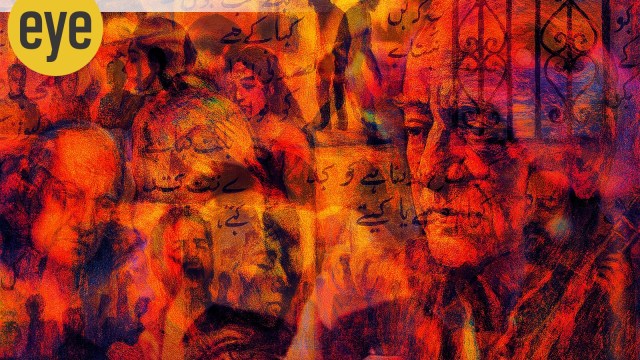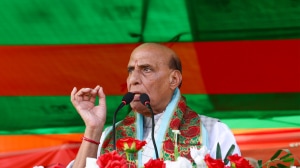‘Bol ke lab azaad hai tere’: Why the world must remember Faiz Ahmad Faiz and his poetry
Today, in a world that churns, collapses, scrolls, posts, forgets—we need Faiz more than ever. We need his words like we need water—fierce, flowing, and essential.
 Recently, the Supreme Court of India reminded us: Urdu is ours. And who better than Faiz to show what Urdu can hold? (Credit: Suvir Saran)
Recently, the Supreme Court of India reminded us: Urdu is ours. And who better than Faiz to show what Urdu can hold? (Credit: Suvir Saran)There are some poets who don’t live in time. They live in pulse. In rupture. In the breath between fear and faith. Faiz Ahmed Faiz is one of those poets. He doesn’t sit on a bookshelf—he lingers in the corner of your room when you cry. He rests at the foot of your bed while you try to sleep. He marches with you to a protest. He murmurs in your ear when love leaves.
Today, in a world that churns, collapses, scrolls, posts, forgets—we need Faiz more than ever. We need his words like we need water—fierce, flowing, and essential. We need his gaze, his grammar of resistance, his gentleness. A voice that doesn’t shout to be heard, but seeps between headlines, between heartbreaks.
Because Faiz reminds us:
“bol ke lab azaad hain tere, bol zubaan ab tak teri hai”
Speak, for your lips are free. Speak, your tongue is still yours.
Faiz wrote not for prizes. He wrote for prisoners, dissenters—for anyone whose voice trembled at the edge of silence. His poems weren’t clothed for applause. They beat like a pulse—steady, strong, subversive. From jails, courtrooms, cells, and solitary walls—they rose with shackles but soared beyond them.
Now, impossibly yet inevitably, he’s being banned, whispered about, erased in places that once celebrated him. His verses, dangerous again. His words, censored again. The irony should not be lost on us. The same lands that toasted him in embassy halls now strike him from syllabi. But the fear is a compliment. Faiz never came to decorate. He came to disturb. Softly. Beautifully. Unforgettably.
Still, to frame him solely as a poet of protest would shrink him. Faiz is longing. Faiz is velvet. He’s an evening with a bruised heart and a hopeful sky. His poetry lifts revolutions but also cradles us like lullabies for the broken.
“tum mere paas raho, mere qaatil, mere dildar mere paas raho”
Stay close to me, my killer, my beloved—stay close.
Who else could place qaatil and dildar in the same breath without contradiction? That’s his gift. Love as resistance. Longing as defiance. Beauty as rebellion. In a world that demands sides—friend or foe, patriot or traitor—Faiz stretches his arms and invites us to feel it all. Perhaps that is the most dangerous thing.
In these times—of forms, declarations, forced allegiances—Faiz urges us to sit in the grey. To feel, to hurt, to hope. He doesn’t demand we burn bridges; he invites us to build them—of memory, music, meaning.
“gham na kar, gham na kar…”
Do not grieve. Do not grieve…
This is no performance. It’s balm. Like your grandmother’s hand on your head. Like a friend’s whisper on a broken street in a city you’re still trying to love. It’s what we all need when the world feels too much.
We live in a world of broadband brutality. Democracies dilute behind hashtags. Truth traded for virality. Rights rebranded as privileges. In this chaos, poets hand us maps—not answers, but better questions.
Faiz didn’t stir bloodshed. He stirred awareness. He lit no fires, but never let the flame die. He fed it with verse. Guarded it with rhyme. Handed it to us like warmth, like a secret.
“tum ye kehte ho vo jang ho bhi chuki
jis mein rakkha nahin ham ne ab tak qadam”
You say the war is over—when we haven’t even stepped onto the battlefield.
What’s more dangerous than a bullet? A poem that shows what bullets fear. A verse that strips lies, exposes euphemisms, names empires. They ban him because he doesn’t hand you outrage—he hands you responsibility. Not slogans, but mirrors.
Recently, the Supreme Court of India reminded us: Urdu is ours. Born in Delhi, Lucknow, Lahore. Not foreign. Not imported. It is the language of court poets and kitchen songs. Silk and sweat. Romance and resistance.
And who better than Faiz to show what Urdu can hold? His Urdu isn’t embellished—it’s earthy. It carries labourers, lovers, revolutionaries. He made words breathe, weep, and whisper.
“aaj ke naam
aur aaj ke gham ke naam”
In the name of today,
and in the name of today’s sorrow.
Who writes like this anymore? Simple. Shattering. Each line a scalpel and a salve. Each verse a verdict.
To deny Urdu, to deny Faiz, is to deny our own memory. And memory is resistance.
Faiz wasn’t just a poet of ideology. He was a poet of intimacy. He didn’t abandon love for revolution. He lived in both.
“mujh se pehli si mohabbat meri mehboob na maang”
Do not ask me for that first love again, my beloved.
He had loved. He had awakened. He reminds us: There is no private joy when the public is in pain. And yet—he loved, he wrote, he remembered.
“yaad ka phir koi darwaza khula aakhir-e-shab”
Once again, a door of memory opened, late in the night…
You can be all of it. Lover. Fighter. Witness. Faiz gives us that permission.
So what do we do with Faiz now?
We read him—aloud. We return him to the air. We quote him in classrooms, parks, Parliaments. We paint his lines on walls, write them in wedding cards. We remind our children that poetry is power. That softness is strength.
“aaj bazar mein pa-ba-jaulan chalo”
Come, walk with me, shackled, in the marketplace…
Faiz walked even when shackled. He sang even when silenced. He smiled even when broken.
At his heart, Faiz believed. Not in dogma, but in justice. In freedom. In us.
“sar karo saaz ki chheden koi dil-soz ghazal
dhoondhta hai dil-e-shorida bahaane kab se”
Tune the instrument, let someone play a soulful ghazal—
my restless heart has been searching for a reason to feel…
Aren’t we all?
Faiz isn’t nostalgia. He is navigation. In a world of erasures, he’s the underline. In noise, he’s the melody. His revolution was never about regimes—it was about remembering. Reclaiming. Loving.
Let us return to Faiz.
“bol, ki sach zinda hai ab tak
bol, jo kuch kehna hai keh le”
Speak—for truth still lives.
Speak—whatever you must say, say it.
And say it like Faiz. With grace. With fire. With language that makes even your enemy pause.
Because what the world needs now—more than action—is poetry.
And Faiz gave us enough for lifetimes.







- 01
- 02
- 03
- 04
- 05
























